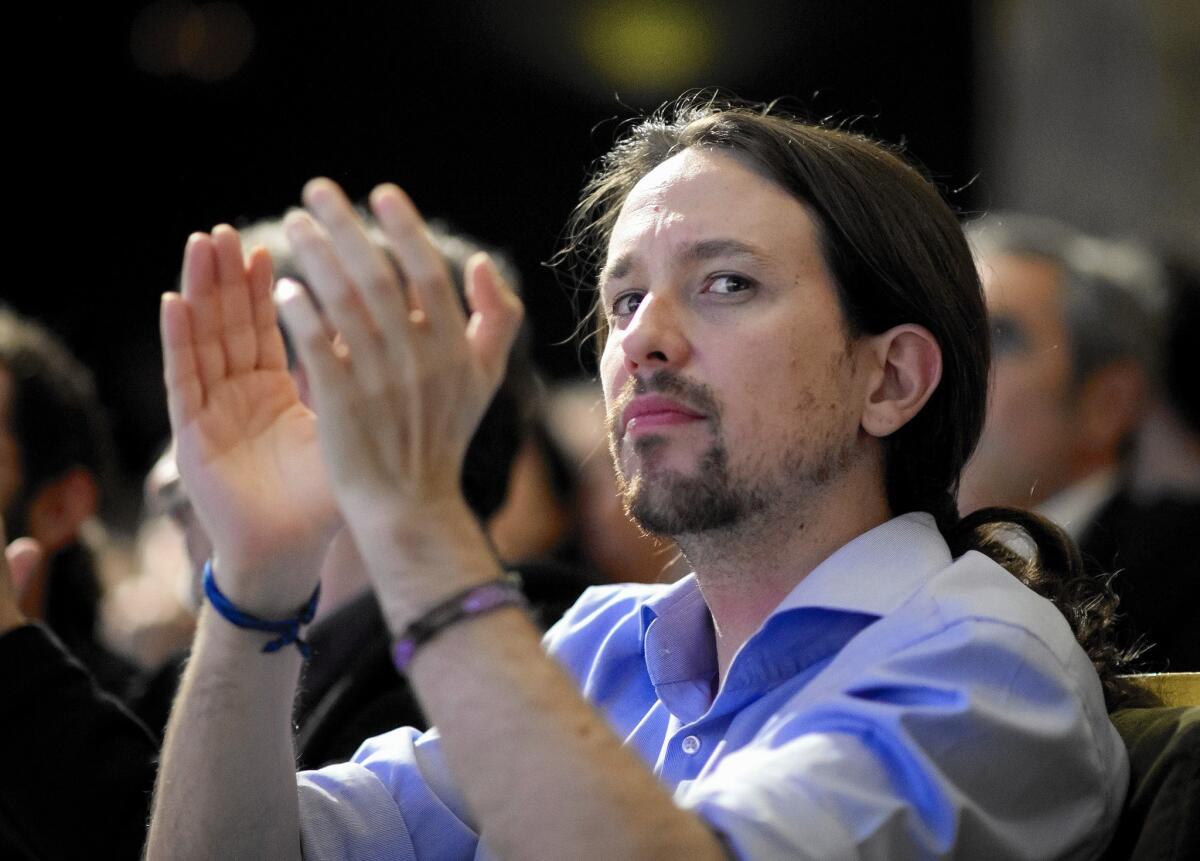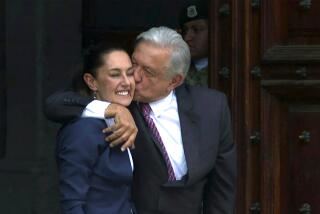Spain’s new left-wing Podemos party stirring up elections

Leader of Spain’s Podemos party, Pablo Iglesias, in Madrid.
reporting from Madrid, Spain — Pablo Iglesias is a popular political science professor known to weave “Game of Thrones” analogies through his lectures on Machiavelli and Marx.
The 36-year-old recently removed his eyebrow piercing, but still sports a long ponytail and lives in a graffitied Madrid slum. He hosts a hit TV talk show on a channel funded by Iran, and once worked as an advisor to his late hero, President Hugo Chavez of Venezuela.
He’s never, ever seen wearing a tie.
But 16 months ago, Iglesias founded a left-wing political party called Podemos — “We Can” in Spanish — that has ruptured the two-party system that has governed Spain for decades and appears poised to capture local government seats across the country in elections May 24. Polls show Iglesias — better known as El Coleta, the ponytailed one — could become Spain’s prime minister.
------------
FOR THE RECORD:
Podemos party: In the May 17 Section A, an article about the Podemos political party in Spain referred to Venezuela as a communist country. Venezuela’s ruling party is socialist. —
------------
Iglesias and Podemos have surprised the political establishment and generated enthusiasm from many residents with their promises of hope and change. Iglesias, a former youth member of the country’s Communist Party, says he would raise the minimum wage, increase taxes on the rich and reevaluate whether Spain should pay its debts, which makes Spain’s creditors and others wary.
“We are humble people, standing up to cowardly politicians who defend only their own privilege,” Iglesias said at a Podemos rally in January at Madrid’s central Puerta del Sol square. “How beautiful it is to watch people make history.”
He urged Spanish voters to follow the example of a fellow quixotic dreamer, Miguel de Cervantes’ fictional hero Don Quixote, and “take their dreams seriously.” In response, a crowd of some 150,000 supporters chanted “Sí, se puede!” — Yes, we can.
Podemos got its inspiration, and many members, from popular assemblies set up at a May 2011 protest encampment in Puerta del Sol square — the so-called indignados, or angry ones — a precursor to the United States’ Occupy Movement. Its name echoes President Obama’s “Yes we can” campaign slogan.
Later in 2011, Prime Minister Mariano Rajoy’s conservative Popular Party won big in national elections and has since ruled Spain with an absolute majority in the parliament. But the austerity measures implemented by Rajoy have upset many Spaniards and opened the door for a movement like Podemos to gain momentum.
Rajoy, nevertheless, seemed dismissive during a party convention this year, calling Podemos “frivolous, incompetent populists”; he said a vote for the party would amount to “playing Russian roulette.”
Rajoy can point to the Spanish economy, which has emerged from recession and is forecast to grow faster than Germany’s this year. Greece struggles to pay interest on 240 billion euros (about $274.8 billion) in bailout loans it received from Europe, but Spain received a 41-billion euro bailout (about $47 billion at current exchange rates) for its banks, and exited that program in early 2014.
But Iglesias argues that Spain’s recovery has come at the expense of the Spanish working-class, which continues to suffer from slumping wages and persistently high unemployment — still 23%. He blames ruling conservatives, Germany and the troika of the European Union, European Central Bank and International Monetary Fund — and vows, if elected prime minister, to roll back the austerity measures they support.
In a recent op-ed in Politico’s Europe edition, Iglesias wrote that capitalism is “a noose around the neck of Europe’s people.” He wrote his PhD thesis on civil disobedience in the anti-globalization movement.
That message resonates with Spanish youths, often dubbed a “lost generation,” whose jobless rate remains more than double the national average, as well as with voters sick of corruption, bribery and kickback schemes that have tainted both of Spain’s main parties, the Popular Party and the Socialists. A top Popular Party figure, Rodrigo Rato, who served as Spanish economy minister and then IMF chief, resigned from the party last year and was arrested April 16 on suspicion of money-laundering and tax fraud.
Iglesias, elected to the European Parliament in 2014, accepted only a quarter of the standard parliamentary salary of about $9,160 a month, saying he refused to earn more than three times the Spanish minimum wage. He gave the rest of his pay to the party and vowed to make public all Podemos financing.
“He’s like one of us. His ideas are what we talk about. We say, ‘we need to change this, we need to change that.’ And that’s what he’s bringing to us,” said Hannah Emeki, a 19-year-old medical student at Complutense University of Madrid, where Iglesias taught before taking a leave of absence to run for office.
As a member of the European Parliament, Iglesias served alongside his friend Alexis Tsipras, whose like-minded leftist Syriza party won power in Greek elections in January. Iglesias campaigned for Tsipras, attending one Athens rally at which the two danced on a stage together to a Leonard Cohen song, changing the lyrics and yelling, “First we take Athens, then we take Madrid!”
But many Spanish voters may not be so keen to follow in Athens’ footsteps. Greece is teetering on the edge of fiscal default. Iglesias has distanced himself from his Greek ally in recent weeks. He has said Eurozone membership, for Spain, is “inescapable.”
“Our victory won’t be conditional on what happens outside this country,” Iglesias told reporters at a news conference last month. “The differences between Greece and Spain are enormous. Spain is the fourth-largest economy in Europe. Luckily, the consequences of austerity haven’t been as bad here as in Greece.” Iglesias, through his representatives, declined requests for an interview.
With general elections expected in late November or early December, polls conducted by universities, polling companies and news media predict that no Spanish party will win a majority of votes. Podemos appears to be neck-and-neck with the conservative party, while the center-right Ciudadanos party from Catalonia vies with the Socialists for third and fourth places. A coalition government looks likely.
Some observers see liabilities for Podemos. Iglesias hosts a talk show called Fort Apache on the Iran-funded Spanish language channel HispanTV. He and two other founding members of Podemos have acknowledged having worked as paid advisors to Venezuela, after studying revolutionary movements in Latin America.
Podemos’ opponents have mocked the party’s links to the communist country, where the inflation rate has skyrocketed, store shelves are bare and electricity is rationed. Other Spanish politicians have championed the plight of jailed Venezuelan opposition leaders. Rajoy met last month with the wife of Antonio Ledezma, the Caracas mayor charged with conspiring against the government of President Nicolas Maduro.
Iglesias, nevertheless, says he’s focused on change for the better and has vowed to hold a referendum on the future of Spain’s monarchy. He joined tens of thousands of Spaniards in anti-monarchy protests after King Juan Carlos’ abdication last June, though when the king’s son, Felipe, took over, the protests dwindled.
Iglesias met King Felipe last month at the European Parliament in Brussels. On a receiving line, the Podemos leader defied royal protocol and handed the king a personal gift: a box set of the “Game of Thrones” TV series.
“I told him it was a series he would definitely like,” Iglesias told reporters afterward, with a wink.
“In Game of Thrones,” he told Spanish radio, “there is a crisis of regime similar to what exists today in Spain.”
Frayer is a special correspondent.
More to Read
Sign up for Essential California
The most important California stories and recommendations in your inbox every morning.
You may occasionally receive promotional content from the Los Angeles Times.










